News
Published 21 August 2025Nine new Companions recognised for leadership and innovation
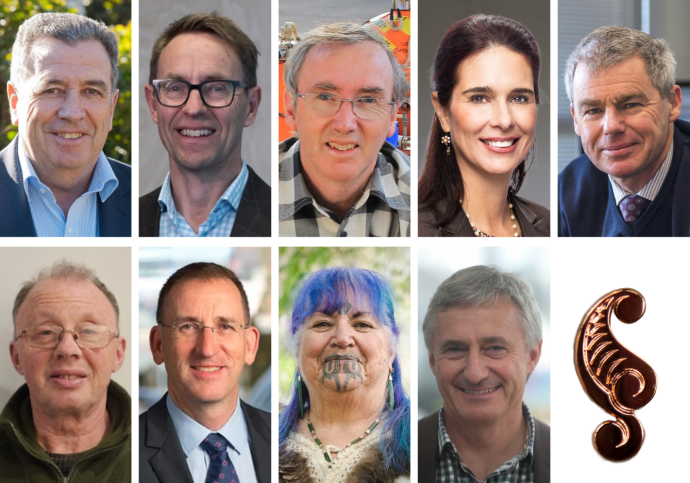
Nine new Companions—Ngā Takahoa a Te Apārangi—of Royal Society Te Apārangi have been elected for their decades-long commitment to their fields.
Those being recognised are:
Peter Barrowclough
Professor Sir Ashley Bloomfield KNZM
Dr Stuart Henrys
Dr Bronwen Kelly MRSNZ
Professor Graham Le Gros CNZM FRSNZ
Dr David Lillis
Dr John McDermott
Dr Te Rita Papesch
Dr William Rolleston CNZM
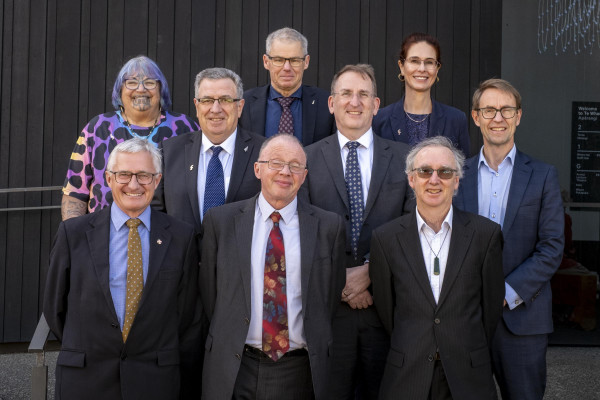
See photos from Ngā Takahoa hou a Te Apārangi new Companion's day
Peter Barrowclough has been elected as a Companion of the Royal Society Te Apārangi for fostering collaboration and commercialisation within New Zealand’s agricultural technology sector.
 As the Chief Executive of Lincoln Agritech Ltd from 2009 to 2023, Peter transformed the company. Under his leadership, Lincoln Agritech grew from 35 to 85 staff and and its revenue increased from $5.5 million to $15 million.
As the Chief Executive of Lincoln Agritech Ltd from 2009 to 2023, Peter transformed the company. Under his leadership, Lincoln Agritech grew from 35 to 85 staff and and its revenue increased from $5.5 million to $15 million.
Peter drove innovation in precision agriculture, environmental sensing, irrigation efficiency, artificial intelligence, groundwater research, new materials, and robotics.
He has overseen commercialisation of multiple technologies during his time at Lincoln Agritech and prior to that at Crop & Food Research, to address critical national issues such as climate change, water quality, and adding value to primary-sector products.
Alongside his executive career, Peter has contributed extensively through governance roles, including at the Precision Agriculture Association, FoodSouth, the Independent Research Association of New Zealand, and the Canterbury Development Corporation, where he contributed to regional economic-development initiatives and earthquake recovery in Christchurch.
Read more: Peter Barrowclough – A bridge between agritech and the commercial world
Professor Sir Ashley Bloomfield KNZM has been elected as a Companion of the Royal Society Te Apārangi for his sustained and significant contribution to public health in Aotearoa New Zealand.
 As Director-General of Health between 2018 and 2022, Sir Ashley led the country’s public health response to the COVID-19 pandemic. The response included implementing contact tracing, widespread community testing, an isolation and quarantine system at the border, lockdown protocols, and a national vaccination programme.
As Director-General of Health between 2018 and 2022, Sir Ashley led the country’s public health response to the COVID-19 pandemic. The response included implementing contact tracing, widespread community testing, an isolation and quarantine system at the border, lockdown protocols, and a national vaccination programme.
His leadership in communicating with the public throughout the pandemic contributed to high levels of trust in the Government’s evidence-based response and to New Zealand’s relatively low mortality from COVID-19.
Sir Ashley has also provided national and international leadership on the prevention and control of non-communicable diseases.
As the National Director of Tobacco Control, he worked with a wide range of stakeholders to strengthen New Zealand’s smokefree legislation, implement smoking cessation programmes, and prevent smoking uptake by young people.
Read more: Sir Ashley Bloomfield – 'COVID curve crusher' recognised for contribution to public health
Dr Stuart Henrys has been elected as a Companion of the Royal Society Te Apārangi for his scientific leadership that has significantly advanced knowledge and understanding of earth science and tectonics in New Zealand.
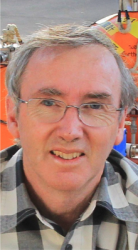 His research has addressed critical issues facing New Zealand and the Pacific, including natural hazards, climate change, and stewardship of natural resources.
His research has addressed critical issues facing New Zealand and the Pacific, including natural hazards, climate change, and stewardship of natural resources.
Through his leadership in establishing and chairing GeoDiscoveryNZ, Stuart has strengthened international collaboration in scientific drilling.
Over the past two decades, Stuart has been a leader or mentor in almost every geophysical investigation of the Hikurangi subduction zone – the nation's greatest earthquake and tsunami hazard.
Read more: Stuart Henrys – Stopping hazards from becoming disasters through geoscience
Dr Bronwen Kelly MRSNZ has been elected as a Companion of the Royal Society Te Apārangi for her outstanding and sustained contributions to the promotion and advancement of research, science, technology and the humanities.

Bronwen has spent her career working at the nexus of academia and government; she is currently the Deputy Chief Executive (Funding & Research) at Universities New Zealand – Te Pōkai Tara.
She has demonstrated exceptional leadership, strategic foresight, and commitment to building collaboration and cooperation within the wider research environment, building trusted relationships, often beyond formal responsibilities, to support long-term domestic and international partnerships.
During the COVID-19 pandemic, she led the creation of a comprehensive research database to coordinate work between universities, Crown Research Institutes, and independent research organisations. This database supported a research-driven pandemic response and continues to be used today, hosted by the Ministry of Business, Innovation and Employment.
Professor Graham Le Gros CNZM FRSNZ has been elected as a Companion of the Royal Society Te Apārangi for his leadership in strengthening national capability to deliver innovative biomedical therapies.
 Graham was Director of the Malaghan Institute of Medical Research for more than 30 years and built the independent charity into a world-class centre for immunology and clinical trials of new vaccines and other treatments.
Graham was Director of the Malaghan Institute of Medical Research for more than 30 years and built the independent charity into a world-class centre for immunology and clinical trials of new vaccines and other treatments.
He led research programmes in allergic and parasitic diseases to investigate how viral, bacterial and parasitic infections can inhibit and exacerbate chronic inflammatory diseases such as asthma.
Graham was pivotal in establishing New Zealand's first clinical trials of CAR T-cells, a treatment which trains an individual’s immune system to target cancer cells.
He was also a founding director of the Vaccine Alliance Aotearoa New Zealand – Ohu Kaupare Huaketo, driving development of domestic vaccine capability during the COVID-19 pandemic.
Read more: Graham Le Gros – Harnessing the immune system to provide effective therapies for all
Dr David Lillis has been elected as a Companion of the Royal Society Te Apārangi for his long service to the Wellington Branch of the Royal Society Te Apārangi.
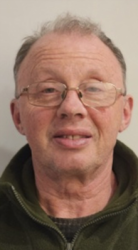
David’s career centred on his interest in physics and mathematics, and as a teacher, lecturer, research evaluator, and statistician with various government bodies.
For 28 years, David has worked to share scientific information, debate, and discussion on a range of topics through regular Branch talks.
He has also written prolifically in various media about his views on science policy.
Read more: David Lillis – a Wellington champion for science and technology
Dr John McDermott has been elected as a Companion of the Royal Society Te Apārangi for his sustained leadership and contributions to economics and public policy.

John has been the Executive Director of Motu Economic and Public Policy Research since 2019, where he has led numerous research initiatives that have addressed critical national issues including climate change, land-use change, carbon farming and human rights.
His leadership as Chair of the Independent Research Association of New Zealand has helped to increase capability in innovative technology and solutions for New Zealand communities and global markets, particularly around primary processing, food safety, environment, infrastructure, society, economy, health and medicine.
Read more: John McDermott – Leading policy and economic research for a brighter future
Dr Te Rita Papesch (Waikato-Maniapoto, Ngāti Porou, Ngāti Whakaue) has been elected as a Companion of the Royal Society Te Apārangi for her work to revitalise and promote Māori performing arts, language and cultural identity.
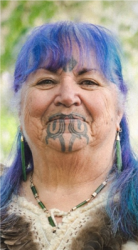 Her academic and artistic leadership has been pivotal in the revitalisation of Māori performing arts, particularly in the areas of composition, performance and contemporary poetry, and in advancing kapa haka.
Her academic and artistic leadership has been pivotal in the revitalisation of Māori performing arts, particularly in the areas of composition, performance and contemporary poetry, and in advancing kapa haka.
As a researcher, she has made a significant contribution to the understanding of the acquisition of te reo Māori in early childhood.
She has published papers and books, and presented widely on the traditional and changing roles of Māori women in the performing arts and in society.
Read more: Te Rita Papesch – Revitalising Māori performing arts
Dr William Rolleston CNZM has been elected as a Companion of the Royal Society Te Apārangi for promoting science and technology in the agricultural sector.

A committed advocate for a strong science system and for evidence-based decision-making in farming, business and government, he has led and served on many boards and committees. These include the Government’s Innovation and Science Boards, the Science System Advisory Group, Federated Farmers, the World Farmers Organisation, Genomics Aotearoa, Biotenz (now BiotechNZ) and the Life Sciences Network – a science advocacy organisation for national science and industry organisations.
He co-founded South Pacific Sera Ltd, a biotechnology business which grew out of his family’s farming operation, and is now an exporter of animal vaccines, biologics, serum and protein products.
Read more: William Rolleston –Speaking up for biotechnology
Updated 10 October 2025
